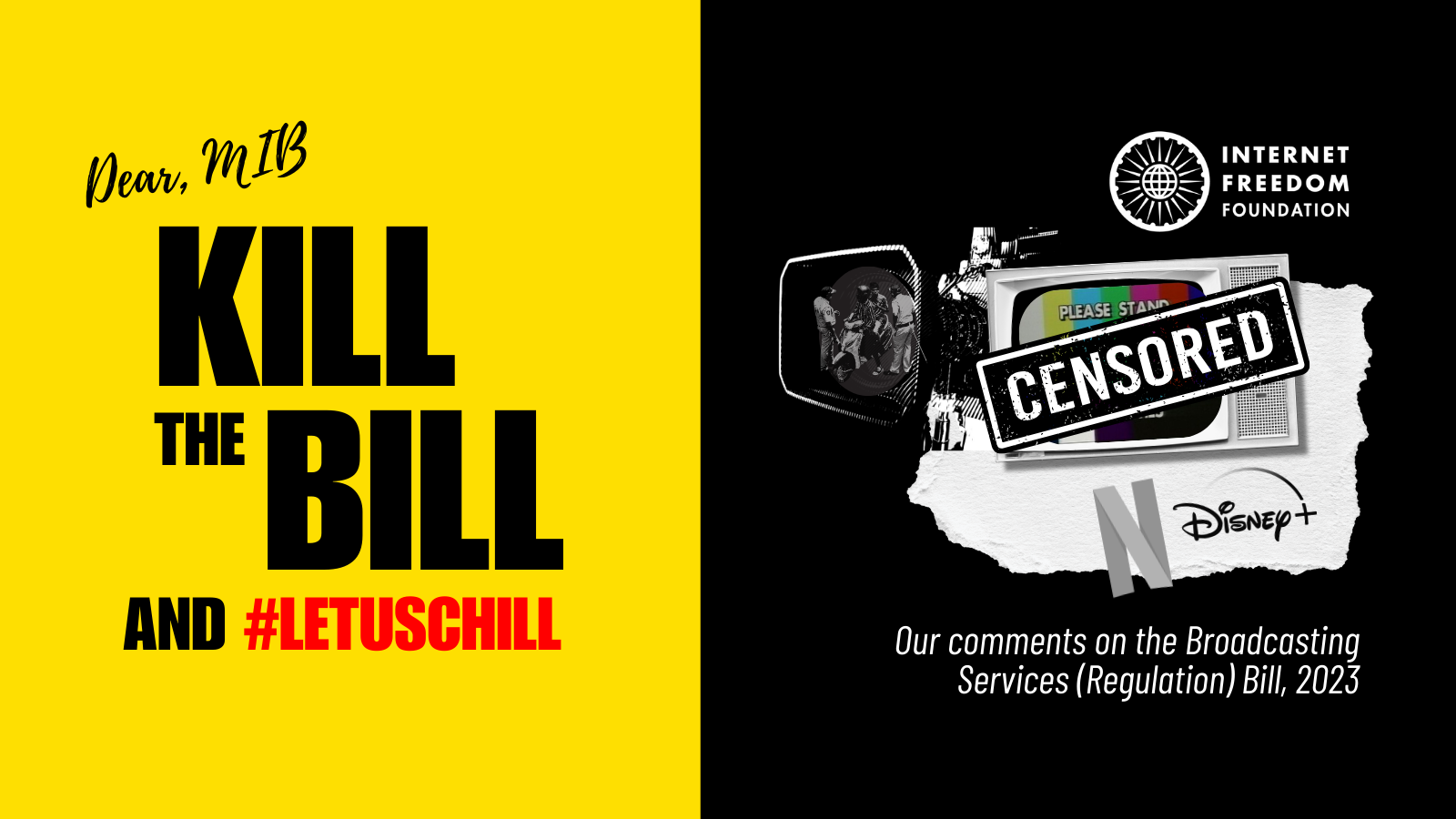
tl;dr
The Broadcasting Services (Regulation) Bill, 2023 (“Broadcasting Bill”) released for public consultation is the latest censorship tool proposed by the Union government. By expanding the restrictive regulations currently applied to cable tv and radio, to “Over-the-Top” (“OTT”) content & digital news published by individuals/ companies, the Ministry of Information and Broadcasting (“MIB”) is allowing for executive control over online free speech and artistic content. We sent our detailed comments to MIB, elaborating on the various rights-infringing concerns arising out of the draft bill.
#LetUsChill
We have sent our comments on the Broadcasting Bill to MIB, and in efforts to simplify your participation in the consultation process, we are sharing a template response similar to ours that you can send to MIB, either edited or in its current form. Our campaign, #LetUsChill, is an attempt to make the public consultation truly participatory and widespread. By visiting letuschill.in you can send detailed comments to MIB and participate in the consultation process, just by filling in a few details. Mass communication of our apprehension and resentment with the Bill may be the only way to break MIB’s historical pattern of paternalistic regulation.
Let us cut to the chase
The Broadcasting Bill was published on November 10, 2023 and public comments on the bill were invited till December 09, 2023. The draft bill was published on the MIB website only in English, creating barriers for widespread public participation. The consultation on this bill, which may have far reaching consequences on constitutional freedoms, will only be informed and meaningful if the Ministry publishes relevant material in the 22 official languages and multiple modes of media, and also conducts open-door, in-person consultations in different parts of the country.
In light of the absence of these crucial conditions pivotal to a meaningful consultation, in our detailed submissions to the Ministry, we urged them to extend the deadline for the submission of comments so that stakeholders have a fair opportunity to understand and analyse the complexities of the bill. On December 7, 2023, following representations from various stakeholders, MIB has extended this deadline to January 15, 2024.
In addition to our concerns around the frictions in the consultation process, there are some key concerns with the bill itself, some of which are mentioned below:
Dear MIB, kindly fill in the blanks
Presence of vaguely or inadequately defined/ undefined terms and instances of excessive delegation of rule-making may lead to uncertainty for the stakeholders and may prevent them from being fully informed so as to meaningfully engage in the consultation process. Ambiguous definitions, uncertainty over scope of application, and reliance on future rulemaking by the executive makes the Broadcasting Bill vague, overbroad, and worrisome, that is open for misuse through subjective and selective application.
Fourth pillar of democracy, who?
The bill extends the Ministry’s regulatory ambit to any person who broadcasts news and current affairs programs through a digital medium (such as online paper, news portal, website, social media intermediary, or other similar medium). This provision will apply to any individual, and not just media companies or journalists, who chooses to share news as part of a ‘systematic business, professional, or commercial activity’. Concerns over how “news and current affairs” is currently defined under the bill and uncertainty over the scope of application of this Clause augment concerns around erosion of democratic principles of online free speech. This will threaten journalistic expression as well as a users’ right to access multiple, diverse points of view, especially given the high penalties prescribed in the draft bill for failing to comply with ethical codes and government orders.
OTT regulation of OTT platforms
If you have a TV series and movies list that you have been planning to watch, the time to binge is now. Because very soon, your favourite shows may not be the same. Violent content, intimate scenes, religiously flavoured content (including satirical, comedic, and factual), politically unpalatable content, and other such “controversial” pieces of content are under threat of heavy modification and censorship. The Broadcasting Bill imposes stringent rules and codes to “OTT” broadcasters, which may lead to risks including, but not limited to, increase in financial and compliance burden; negative impact on user experience, choice, and even costs borne by the users; entry barriers; stifled innovation; and potential censorship, both imposed and self-applied.
Your regulatory structure is in retrograde
The Union government’s powers with respect to the third-tier in the regulatory structure, unreasonable reliance on future rulemaking powers/ delegated legislation, as well as the inspection and penalty provisions (such as to prohibit operation in public interest), create a skewed power dynamic. In light of the several documented instances (see here, here, and here) of the Union government imposing restrictions and exercising ultimate discretion with the content published by “OTT” broadcasters as well as news publishers, the MIB must refrain from creating overbroad provisions which empower the former with unbridled censorship powers and may impose restrictions of constitutional freedoms.
Kill the bill
Risks around censorship of speech expressing satire, irony, sarcasm, dissent, anger, even maybe portrayals of facts and hard-hitting truth which is unpalatable to the Union government or politically influential and powerful communities, may become formalised if the Broadcasting Bill becomes a law of parliament. Given MIB’s historical baggage with paternalistic regulation, moral policing, and censorship of curated content as well as news media, this bill may very well alter the digital space, for creators and consumers alike. We thus urge the Ministry to withdraw the Broadcasting Services (Regulation) Bill, 2023 in its entirety, to refrain from acting as a ‘moral compass’, and to steer away from dictating modifications and deletions.


